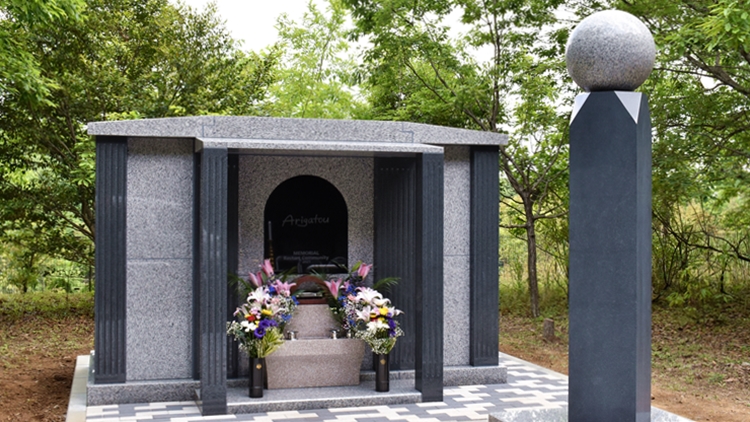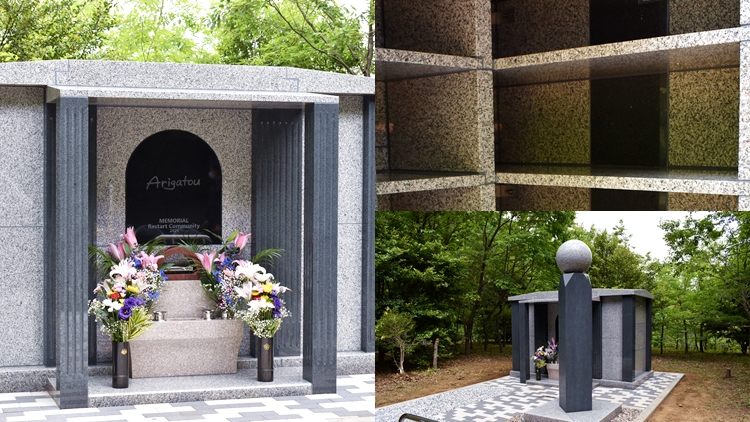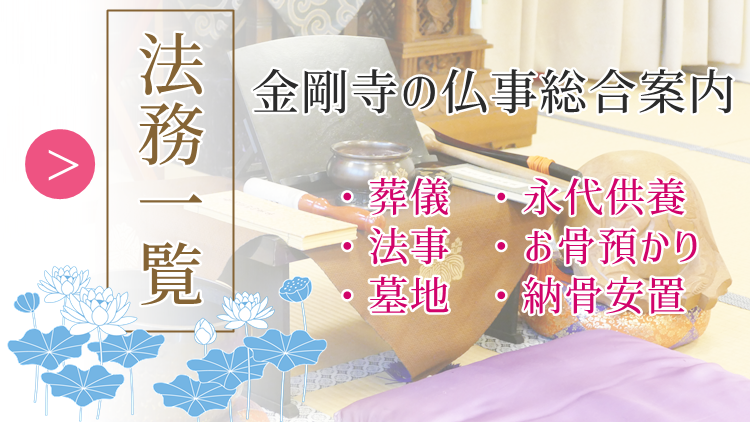
国際共同供養墓(外国人用供養墓)
国籍・宗教問わず納骨できる共同供養墓として、日本在住の外国人のために建設された国際共同供養墓です。(八王子の多摩八王子霊園内)

ニッケイ新聞WEB掲載記事
東京都=国際共同供養墓が15日完成=国籍宗派問わず4万円納骨=「外国人も安心して死ねる社会に」
▸ニッケイ新聞サイトにリンクいたします
納骨について

共同供養墓は合葬墓となるため、納骨後の返骨はできません。
●合葬につき納骨後の返骨はできません
●お申込み以降の金銭的負担はありません
●年間管理料、寄付などありません
●過去の宗教不問
国際共同供養墓は金剛寺境内にはございません。
所在地
東京都八王子市加住町2丁目398
多摩八王子霊園(霊園案内 外部サイト)
the article reprinted from Yahoo news
Yahoo newsより転載しております
A cemetery for non-native. Is it available in Japan regardless of nationality and religion?
The number of resident aliens in Japan was 2,885,904 as of the end of June 2020, according to the Immigration Services Agency. From 2013 on the number of registered foreign nationals had kept on increasing and shown a new record high every year, until the trend began to decrease around February 2020 with the rapid spread of the Covid-19 pandemic.
However, as symbolized by the amended Immigration Control Act which entered into force in April 2019, labor shortages are becoming increasingly serious due to the dwindling birthrate and aging population in Japan. As this is the case, it is widely anticipated that the inflow of foreign workers will increase when the pandemic is over.
The share of foreign workers accounts for around 2% of the Japanese total population of 125.9 million, at a rough estimate. I think readers have realized this fact. For instance, you often see many foreign people working at nearby convenience stores, restaurants, construction sites and so forth. In this way, internationalization is going on in cities as well as in rural areas, so that foreign labor power is indispensable to maintain the Japanese economy. These foreigners have adapted successfully to Japanese society, while living normally with their families. In the process of this adaptation of non-native people here, there are some inevitable issues.
One of the most significant problems is the present situation of cemeteries for foreigners. More specifically, there are cases in which foreigners' remains are not accepted by Japanese cemeteries because of the difference in burial methods depending on nationality and tradition.
This article considers the above issue through an interview in two parts with Taido Ishige, who is the Chief Priest of Tokuunji Temple in Ishikawa Prefecture. Ishige has been making efforts to solve the issue as a religious specialist.
Suzuki (“S” below): I look forward to talking with you today. I know there are many problems with burials and cemeteries for foreign people who have passed away while resident in Japan. Considering the status and the future of Japan, these problems will become more and more important for non-native residents. To begin with, would you summarize the historical background and the current situation of the issue? I see the media have reported on problems associated with burials for Muslims in particular.
"Burials considered from the controversial issue of interments of Muslims"
Taido Ishige (“Ishige” below): According to a survey, the current population of Muslims in Japan is close to 200 thousand. It is anticipated that the number of immigrants from Islamic countries, such as those in Southeast Asia, will increase to meet the growing need for labor in the aging society with fewer children here. They say the population of Muslims here will exceed 300 thousand in 2050. As Islamic doctrine prohibits the intentional disfiguration of one’s body, the remains must be buried in the same condition as when the deceased was alive. Accordingly, the remains should be interred. However, there are only a few cemeteries where interments are allowed, due to restrictions in Japan (Note). In Kyushu area in particular, there is no such cemetery at all. As a result, in some cases it may not be possible to bury remains because of the overall insufficiency of cemeteries for Muslims where interments are allowed without requiring cremation. Therefore, the lack of cemeteries is a serious problem for Muslims in Japan.
S: I understand. Would you give examples of cemeteries where interments are allowed?
Ishige: For instance, Tama Reien (Tama Cemetery) in Fuchu City is one. There rest 426,786 mortals (as of April 1, 2021) in 128 hectares (27 times larger than Tokyo Dome, a popular baseball stadium in downtown Tokyo). This cemetery is celebrating the 100th anniversary of its opening in 1923. Recently, there is a growing tendency to dismantle family tombs and move to group graves or foreign cemeteries due to the absence of relatives to take care of the place or in order to avoid burdens on future generations. In a corner of this cemetery, there is a place where you find signboards reading “Foreigners” everywhere, indicating that there rest non-native people who have passed away in Japan. The tombstones are in various forms. Some of them have crosses, while others are engraved with foreign letters. This place used to be for interments, although it is not the case nowadays.
S: Thank you for the information. What is the general consciousness on burials among Japanese people?
Ishige: Tetsuo Yamaori, a religious philosopher, says, “It has become prevalent to send remains directly to crematories from homes or hospitals without funeral rites. The idea of the soul and the next world after death has been lost, so that remains are to be disposed of just like raw garbage. Only the convenience of survivors matters, I feel.” There are also affirmative opinions on interments that promote the idea of human beings within nature and the cycle of life, offering good opportunities to change views of life and death in Japanese society. On the other hand, other people might say, “When in Rome, do as the Romans do,” meaning that the non-native people should accept cremation since they live in Japan. Let us play the devil’s advocate here. For instance, imagine that you had lived and died in India. What would you say if you were told that your ashes should be thrown into the Ganges River in the Indian custom? Or would you be able to accept the so-called sky burial in Tibet, casting your remains over a cliff to feed the birds? I think it would be a difficult decision for you. In the meantime, it is very hard in Japan to develop cemeteries where interments are allowed for foreign people. These projects are likely to be refused in the face of opposing opinions such as “Interments are freaky” or “There are sanitation issues.” There is a lack of understanding regarding differences of language, culture, religion, and ways of burial, as well as prejudice against foreigners. I am afraid this regrettable situation stands regarding the issue.
S: I know the existence of the issue and that it has not been possible to resolve so far.
There is no time to waste for solving the problem, as the number of non-native people is expected to increase rapidly from now on. By the way, what is the current situation of burials in Japan?
Present situation of burials in Japan
Ishige: According to the Ministry of Health, Labor and Welfare, there were 7,338 crematories nationwide at the end of 2000. In 2021, according to the government’s rough estimate from the population statistics of the year, the number has fallen to 4,307, 40% down, due to the merging of municipalities and other reasons. On the other hand, the death toll increased to 1,452,289, up 67,745 compared to the previous year, caused by the prevalence of the highly contagious coronavirus Omicron variant and other reasons. In most cases, remains were cremated, so the number of cremations was the highest since World War Ⅱ. Out of the world total population of approximately 7.8 billion as of 2020, Muslims and Buddhists comprise 25.0% and 6.3% respectively, while Christians account for 31.3%. As Christians and Muslims are generally supposed to be buried, it is considered that interments form a majority of 56.3%. While Japanese people consider cremation a matter of course, it is not necessarily common from the global point of view. However, the number of countries where cremation is being introduced is continuing to rise, in expectation of resolving hygiene problems associated with the Covid-19 pandemic and the lack of land for burials. At present, the rate of cremation is 99.98 in Japan, 96.19% in Taiwan and 93.34% in Hong Kong. Accordingly, Japan ranks at the top in the world in terms of the number of cremations, with the most advanced culture and technologies regarding that funerary method.
S: I didn't know that. Would you tell us more about cremation, please?
Ishige: Looking into the origin of cremations, there was a kind of cremation called Kamado-zuka (stove-cemetery) in ancient times. They laid ashes to rest in tombs. I think the tradition of cremation gradually became rooted among Japanese people, supported by the historical fact that the Buddha, the founder of Buddhism, was cremated. The serious insufficiency of land due to the rapid urbanization during the high economic growth period was also an important factor in making cremation the major funerary method in contemporary Japan. In the long history of Japan in terms of culture and customs, interments were predominant instead of cremation, as from ancient times through the Edo era (1603-1868), people strongly believed that damaging remains was not ethically permitted. It was around 1935 when cremations exceeded interments in terms of numbers. The ratio of cremations remained at about 80% in the 70s. It is only over the past 100 years that heavy oil and gas have been used as fuels at crematories as they are now.
S: That's news to me. Thank you very much.
Note: The Act on Cemeteries and Interment, Etc. of Japan does not prohibit funerary methods other than cremations, such as interments. However, administrative authorities recommend cremation, from the standpoints of the environment and the health of the nation.
Especially in the Tokyo metropolitan area (excluding outer islands, ten cities among which are Hachioji, Machida, and Kunitachi, two towns and one village) and the Osaka metropolitan area, interments are prohibited by local ordinances. This is one reason why it is difficult to find cemeteries for interments in Japan.
Brief biography of the interviewee: Taido Ishige, Chief Priest of Tokuunji Temple
Studied under the high priest Chimyo Miwa, a leading student of the high priest Etsuzen Miwa, who in turn was a follower of the Zen master Chisan Koho, 18th head abbot of the Soto Zen Buddhist Sojiji Temple.
Mr. Ishige is the Chief Priest of Tokuunji Temple, which belongs to the same sect as Sojiji Temple and has a history of about 600 years in Ishikawa Prefecture.
S: I’d like to change the subject from cremations and interments. You have helped me realize that cemeteries for foreigners are insufficient. What is the status of countermeasures for the issue so far?
Acceptance of ashes and other issues
Ishige: That is very perceptive of you regarding the problem. Not only Muslims but also many other foreign people in Japan are worried about similar issues. In short, some Japanese cemeteries refuse to accept ashes because of the nationality of the deceased. For instance, there is the issue of the descendants of Japanese immigrants. In the past, 250 thousand Japanese immigrated to Brazil as a result of immigration policy of the government. Thereafter, the second and third generations, that is the descendants of the immigrants to Brazil, have come to Japan as workers seeking high income opportunities. Some of them stay as immigrants to Japan, and their number is ever increasing. Some of them may pass away with no way to contact their bereaved family members or friends. In a situation like this, third parties such as their churches are forced to keep the ashes in custody, because there are no other choices. Others may pass away attended by their family and their ashes remain in closets, because the bereaved family cannot find cemeteries which accept the ashes of foreigners. A diplomat from the Embassy of Brazil who is in charge of counter services for Japanese Brazilians discusses this harsh plight. He says, “When they left Brazil for Japan, I suppose they had dreams and hope for the future. While some of them may succeed and become rich, many others may be forced to live hard lives without sufficient social security, such as medical and nursing-care services or pensions. When they pass away here, to make the matter worse, it is difficult to find cemeteries which accept the ashes of the deceased. Although it might be an exaggeration, the ashes are often treated as garbage." Considering this situation, I would say we need to engage in society-wide efforts to prepare places where the foreign workers who have supported the Japanese economy so far can rest in peace, regardless of nationality, when they pass away here.
S: That’s too bad. I hear you are acting vigorously to improve the status by means of a practical approach. Could you tell me about your activities on the issue?
Ishige: In 2021, I, as the Chief Priest of Tokuunji Temple, which manages Tama Hachioji Cemetery, established the Memorial Restart Community (MRC), with Takaharu Hayashi, Representative Director of the Japan Overseas Council. MRC is the first burial vault in Japan where foreign people can entrust remains at a reasonable cost, regardless of race, nationality or religion. The cemetery has accepted remains of Brazilians in Japan so far, and the usage of the place will go on increasing among other people such as Vietnamese, corresponding to the increase of workers here. The ossuary is made of stone imported from Brazil, with a fashionable and unique design by Yoshihiko Tsutsumi from Kumamoto Prefecture. Regarding the payment of the charges for utilization, individual circumstances will be considered. (Note)
S: Thank you. I understand that private organizations like yours are conducting various activities in order to find solutions to the issue. Do you have anything else to tell the readers about your activities or other subject?
Something you should know: Internationalization in the true sense.
Ishige: Although the subject may be a little different from the purpose of this interview, I’d like to talk about human beings and their deaths. Human beings (Homo sapiens) are said to have originated in Africa some 200 thousand years ago. More than 7.8 billion people now live on earth. Although there are differences in race, language and religion among us, we share the same roots. Since the emergence of human beings, we have spread all over the world and have become different in terms of language, culture, lifestyle, ethnic group or nation, religion, attitudes, values and so forth.
On the other hand, it has become easier to move anywhere, as we advocate a global society so that occasions increase to live or work abroad, facing difficulties living as non-native citizens. From now on, this tendency will increase further. Some foreigners, living in Japan for instance, will claim their rights, a stance which comes as no surprise. In that situation, Japanese people may be surprised or realize that the global standard is different from the Japanese standard. You may say that such situations have already become common, as I have said so far. In addition, I’d like to talk about the deaths and lifespans of human beings. The average lifespan of the Jomon people is thought to have been 14.6 years regardless of gender, because of their tremendously high child mortality. In contrast, the lifespan of modern humans has been prolonged with advances in medical technology. We often hear that we have reached the stage of the 100-year lifespan now. However, even if a silver bullet for cancer were developed, people must die someday. As in the expression “from the cradle to the grave,” which is derived from British national policy, our clock keeps count from the moment of birth until we die. Pascal, a French philosopher, wrote that humans are born to be criminals under sentence of death. In any case, our death rate is 100%. As I have mentioned so far, the issue of cemeteries for non-native people is raising many questions about our society.
Furthermore, the Russian invasion in Ukraine, which broke out on February 24 this year, is still going on. This war is totally unacceptable today, the twenty-first century, for its inhumane acts and brutality. The war has caused the reduction of imports of resources such as energy, foods, and raw materials from Russia and Ukraine to the rest of the world, ultimately decreasing production worldwide. In this way, the war has had significant effects not only on the western countries but also on Japan, which is far away from the battlefield, casting shadows on the economy and the society. However, as we all know, it is impossible for human beings to survive alone. The same is also valid for countries in the global society. In particular, Japan, with few natural resources, has no option other than to seek prosperous coexistence with other countries in order to keep on thriving. In this sense, I hope Japan will become the envy of all, regarded as a country and society where many people from all over the world want to keep on living. To make Japan a country and society like this, the social frameworks must be ready for peaceful multicultural coexistence. From various points of view like this, and in the sense that I have mentioned so far, I would say each of us is currently thinking seriously about the issue of cemeteries for foreigners as a problem.
S: Thank you for your time. It has been a valuable opportunity to see the issue of cemeteries for non-natives in a new light, as it is a quite important and unavoidable problem for Japan in consideration of how she should build relationships with other countries in the global society, and what kind of society she should aim to develop in the future. I appreciate this point as well.
Education: Bachelor of Arts from Keio University. Doctorate from Graduate
School of Public Management, Waseda University.
Studied international culture and religion at Strasbourg University (France).
Foreign aid activities: He has contributed to African countries in child
education and construction of schools and wells, etc.
Contact e-mail address at Tokuunji Temple: tokuunjikongou@gmail.com



